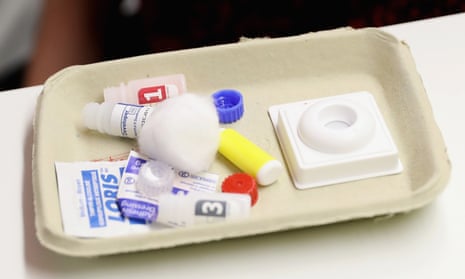After a routine operation in hospital, the nurse asked if I had any other conditions or was taking any medications they should know about. When I said I had HIV and was taking antiretrovirals, she proceeded to mark “HIV-positive” in big red letters at the top of my chart.
I was shocked and embarrassed, and we got into an argument about the need to write my HIV status so boldly for all to see. “People need to know,” the nurse said. I am not ashamed to be HIV-positive and I have long come to terms with the diagnosis that would change my life for ever, but the nurse’s attitude towards me and my status brings into sharp relief the prejudice and discrimination that abounds even in places like hospitals. Here, some nurses, doctors and medical professionals, despite all the data and learning at their fingertips, still fear they will contract the virus from HIV-positive patients.
I have been living with HIV for a number of years and working within the HIV prevention and support sector for just as long. It has always been important to me to help empower other women to seek the support and care they need because black women are consistently erased and overlooked when it comes to HIV messaging and prevention.
In 2016, 79% of all women accessing HIV care in the UK were from the black, Asian and minority ethnic (BAME) community. Despite this outrageous reality, black women bear the brunt of funding cuts and are erased from mainstream HIV prevention messaging, leaving us more vulnerable still. In the fight against HIV, much more needs to be done to account for the intersectional experiences of black women, who fight against the sexism, racism and misogyny that excludes us from the strategy, research and decision-making yet platforms and keeps visible other groups vulnerable to the virus.
Public Health England has released data that shows the UK has reached UNAids’ 90-90-90 targets. This news represents an unfathomable leap of progress in such a short time and is a nod to the tireless activism and biomedical advances that prolong lives and prevent transmission. HIV has moved from a terminal to a chronic condition, but the stigma associated with it has not moved at the same pace.
What’s more, what this triumphant progress doesn’t explain, or even begin to address, is why so many black African and Caribbean women in the UK remain so vulnerable to the virus. It doesn’t explain why the number of black African and Caribbean women declining HIV tests has increased by 52% since 2012. It doesn’t explain why, when black women make up the majority of those seeking HIV care and support, we remain largely invisible across major HIV prevention and awareness campaigns.
This World Aids Day I want to draw attention to those still disproportionately affected by HIV, and to two organisations and programmes working to help them. Through Centres for All Families Positive Health, my team and I work to deliver culturally sensitive, client-centred and targeted social support for those living with and affected by HIV across Luton, Bedford and the east of England. NAZ, a charity delivering HIV prevention and support services to BAME communities across London, is leading on the Rise partnership – a multi-organisational programme delivering sexual health services to black African and Caribbean and men-who-have-sex-with-men communities across Lambeth, Southwark and Lewisham.
In each of these organisations and programmes there is a drive towards women-centred and culturally specific programming that has demonstrable results. As ever, the refrain “hard to reach” becomes moot when one realises we’re not hard to reach at all – we simply need to be spoken to in the right way and by the right people.
What I’ve learned, both as a black woman living with HIV and a black woman on the frontline of the fight against HIV, is that white gay men should not be the main indicator for progress in eradicating HIV. We must also recognise that the condition is the number one killer of women aged 15-49 globally. We must continue to fight for visibility and funding and to combat the stigma and shame that comes with an positive diagnosis.
As a recent documentary on the role women play in the eradication of HIV, Nothing Without Us, put it: for all men have done to raise money and fight HIV/Aids, “it will be women who close the door on the epidemic”. With the commensurate funding and organisations taking more seriously the urgency of incorporating black women into their strategy and decision-making, there is the very real possibility that we could yet end HIV/Aids for all of us.
